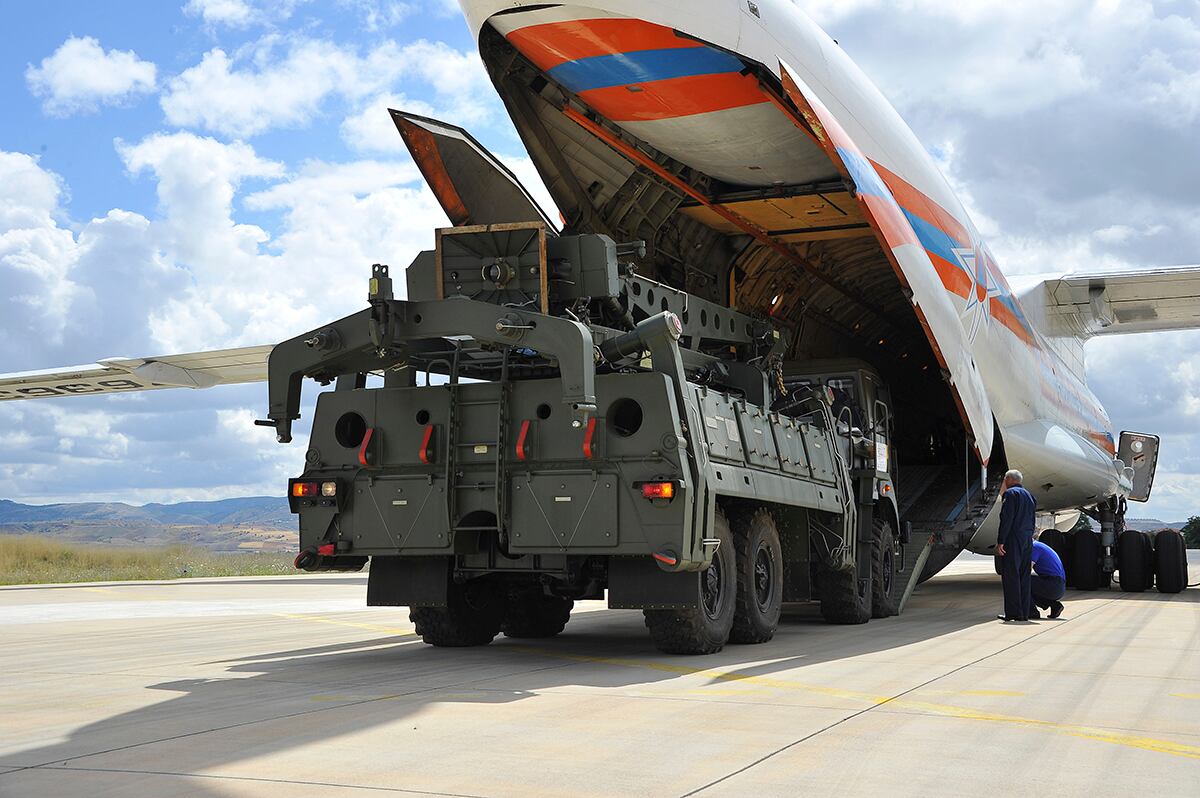This story was updated with additional quotes from U.S. President Donald Trump and defense secretary nominee Mark Esper.
WASHINGTON ― After days of silence about whether Turkey will be punished for accepting a Russian-made air defense system, U.S. President Donald Trump reluctantly seemed to agree Turkey will now be cut off from the F-35 fighter jet.
Though Washington has repeatedly warned that the Russian system, the S-400, is incompatible with NATO systems and is a threat to the F-35, Trump expressed sympathy toward Turkey’s decision. He portrayed the Obama administration as refusing to sell Turkey an American alternative — the Patriot missile defense system — until after the S-400 purchase was complete.
“So what happens is we have a situation where Turkey is very good with us, very good, and we are now telling Turkey that because you have really been forced to buy another missile system, we’re not going to sell you the F-35 fighter jets," Trump said. "It’s a very tough situation that they’re in, and it’s a very tough situation that we’ve been placed in, the United States.”
“With all of that being said, we’re working through it, but it’s not really fair,” Trump added. “Because they bought a Russian system, we’re not allowed to sell them billions [of dollars worth] of aircraft. It’s not a fair situation.”
The administration’s delayed response has fueled speculation Trump was looking to avoid a fight with Turkish President Recep Tayyip Erdoğan, with whom he has previously sympathized. And notably, Trump did not say whether he would impose sanctions on Turkey under the Countering America’s Adversaries Through Sanctions Act, or CAATSA.
But members of Congress this week said the law is very clear: Trump has no choice but to sanction its NATO ally.

Days ago, Erdoğan expressed a belief that Trump has the authority to waive sanctions on Turkey for its purchase of the Russian air defense systems and must “find the middle ground.” But Trump may find Congress closed the door to compromise when it set a high bar last year to waive U.S. sanctions on countries that buy Russian weapons.
Lawmakers from both parties said the waiver language was included to accommodate allies India and Vietnam, it was tailor-made not to let Turkey off the hook for its purchase of the S-400, and a waiver would be impermissible under current circumstances. The White House, under the law, will instead have to choose from the law’s menu of sanctions, several lawmakers said.
“There’s wide latitude about what to do about the sanctions, but the sanctions certainly need to be put in place,” Oklahoma Republican Sen. James Lankford, a critic of Turkey and one of the lawmakers involved in drafting the waiver provision, said Tuesday.
Stealthy trouble
For years, the U.S. and other NATO allies have expressed alarm that plugging the Russian system into the alliance could lead to data leaks and security breaches, voicing fears it would allow Russia to gain information about the stealthy F-35 fighter.
The Turkish Defence Ministry on July 12 announced it received the first pieces of the S-400 at Murted Air Base, near Ankara. That delivery was marked as a trigger for sanctions against Turkey and a breaking point for its participation in the F-35 program.
The Pentagon initially called a press briefing the morning of July 12, then rescheduled it for later that day; it was eventually postponed indefinitely. While defense secretary nominee Mark Esper briefly said Friday that the “position regarding the F-35 has not changed,” no detailed statement about the F-35’s fate had been issued until Tuesday, when Esper was asked about it during his Senate confirmation hearing.
“It’s certainly disappointing. Those are my words. Very disappointing,” Esper said. “The policy that I’ve communicated to my counterpart, if confirmed, defense minister, is you can either have the S-400 or the F-35. You cannot have both. Acquisition of the S-400 fundamentally undermines the capabilities of the F-35 and our ability to maintain that overmatch in the skies going forward.”
Turkey, a partner in the F-35 program that helped fund the development of the jet, planned to buy 100 F-35As. Its first jet was rolled out in June 2018 in a festive “delivery ceremony."
Though Turkey formally owns its jets, the U.S. has the power to keep the planes from moving to Turkish soil and intends to keep all four existing Turkish jets from leaving the United States. The U.S. has stopped training Turkish pilots on the F-35 and has given Ankara until the end of July to get its personnel out of the country.
Sanctions coming
U.S. Secretary of State Mike Pompeo told The Washington Post on Sunday he was confident the president would levy sanctions as CAATSA requires. “The law requires that there be sanctions and I’m confident that we will comply with the law and President Trump will comply with the law,” Pompeo said.
Turkey has refused to bow to U.S. pressure, insisting that choosing which defense equipment to purchase is a matter of national sovereignty.
Although Trump expressed sympathy toward Turkey’s decision to purchase the Russian system during a meeting with Erdoğan on the sidelines of a G-20 meeting in Japan, Washington has repeatedly said that the Russian system is incompatible with NATO systems and is a threat to the F-35.
Lankford and the Senate Foreign Relations Committee’s ranking member, Sen. Robert Menendez, D-N.J., echoed that argument this week as reason to punish Turkey.
“Unlike India, Turkey is a NATO ally, the interoperability of our systems is critical, the inability of us to have an F-35 next to an S-400 is crystal clear, and [Turkish officials] were given options,” Menendez said. “In every respect, they turned their backs on us. They had an option and they refused to do so. That’s why there’s not going to be a waiver.”
“We’re trying to make it clear that if you get Russian equipment, especially with them parking an F-35 next to an S-400, there’s no way you can do that. They’re not compatible,” Lankford said. “All this conversation about ‘we’re going to study it, we’re going to examine it’? We already know what the end result is on that. We don’t want to incentivize people using Russian and American equipment together.”
Erdoğan’s comments — that Trump “has the authority to waive or postpone CAATSA” — came two days after NATO member Turkey took delivery of the first tranche of parts for the advanced Russian S-400 missile defense system, despite warnings from Washington that the move would trigger CAATSA.
“Since this is the case, it is Trump who needs to find the middle ground,” Erdoğan told Turkish journalists, per Reuters.
In 2017, Congress overwhelmingly passed CAATSA, which was aimed at punishing Moscow for meddling in the 2016 U.S. election by targeting Russia’s defense and energy businesses. If the president determines a person has engaged in a “significant transaction” with the defense or intelligence sectors of the Russian government, the president must choose to enact five from a dozen types of sanctions it outlines.
Congress passed the subsequent waiver after lobbying by then-Defense Secretary Jim Mattis. He argued the sanctions offered no flexibility for allies in Asia who still need to deal with Russia to maintain older equipment.
The language inserted in the 2019 National Defense Authorization Act offers a national security waiver, but only if Trump certifies the transaction would not be with an entity directly tied to cyber intrusions; endanger U.S. multilateral alliances or operations; increase the risk of compromising U.S. defense systems; or negatively impact defense cooperation with the country in question.
The president also must certify that the country is taking steps to reduce the share of Russian-produced arms and equipment in its total inventory or is cooperating with the U.S. on other matters critical to U.S. national security. As of yet, the administration has not used this waiver authority.
“It was drafted very stringently,” Sen. Jack Reed, D-R.I., the Senate Armed Services Committee’s ranking member, said of the waiver language. “[Middle ground] would be very difficult because we have made it clear repeatedly, myself and my colleagues, that if Turkey is going to buy the S-400, they cannot have the F-35, and similarly the language of CAATSA suggests sanctions have to be applied.”
RELATED

According to the Center for a New American Security’s Neil Bhatiya, the CAATSA waiver was written so it could not be granted to Turkey. Still, Trump could act unilaterally, more or less daring Congress to take legislative action to ramp up sanctions, Bhatiya said.
“They would be the only state that would be getting the S-400 and part of a multilateral alliance where we would be introducing technology that would be put at risk,” Bhatiya said. “So the reputational risk Trump would be taking by granting a waiver would be quite high, especially because the Pentagon and State Department have said, essentially, they want the sanctions.”
If Trump were to attempt to provide a waiver, he would see a strong bipartisan response, according to Sen. Ben Cardin, D-Md., a senior member of the Senate Foreign Relations Committee. “I would think there is support in Congress to do everything we can to make sure there is no waiver. Turkey’s been on notice on this, and it’s a pretty clear violation.”
Sanctions would mark a new low in the already tense relations between Turkey and the U.S. Last year, the United States imposed sanctions on Turkey over its detention of an American pastor, triggering a Turkish currency crisis.
Because CAATSA provides an array of options, Trump could opt for lighter sanctions or target members of Turkey’s defense apparatus who have little or no connection to U.S. financial systems, Bhatiya said.
“There is a menu of options and there could be something that’s not the death penalty for the Turkish economy,” Bhatiya said.
The Associated Press contributed to this report.
Joe Gould was the senior Pentagon reporter for Defense News, covering the intersection of national security policy, politics and the defense industry. He had previously served as Congress reporter.
Aaron Mehta was deputy editor and senior Pentagon correspondent for Defense News, covering policy, strategy and acquisition at the highest levels of the Defense Department and its international partners.





